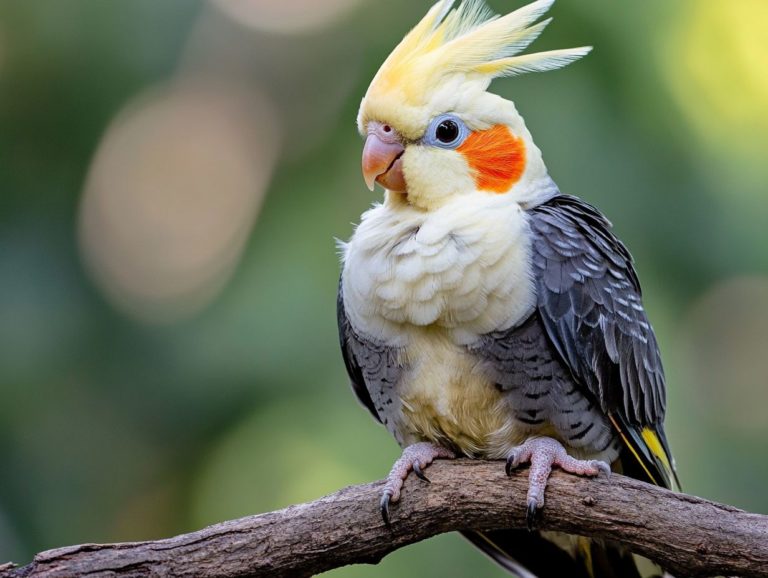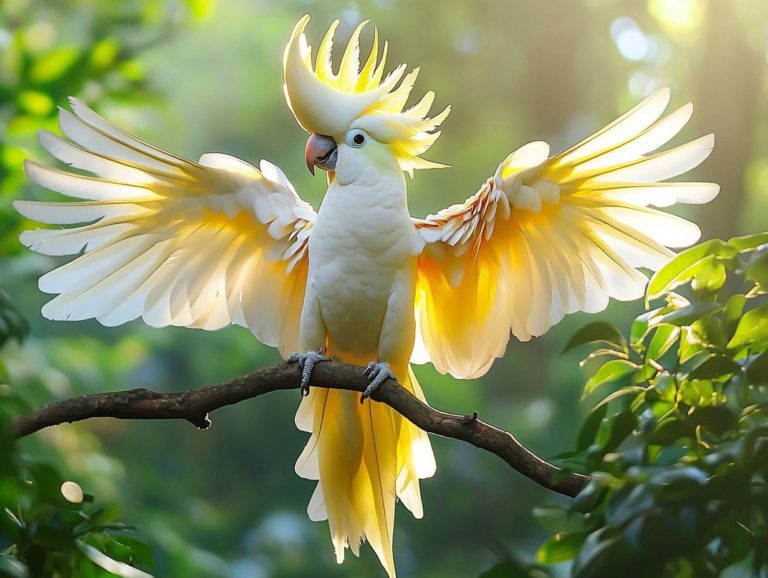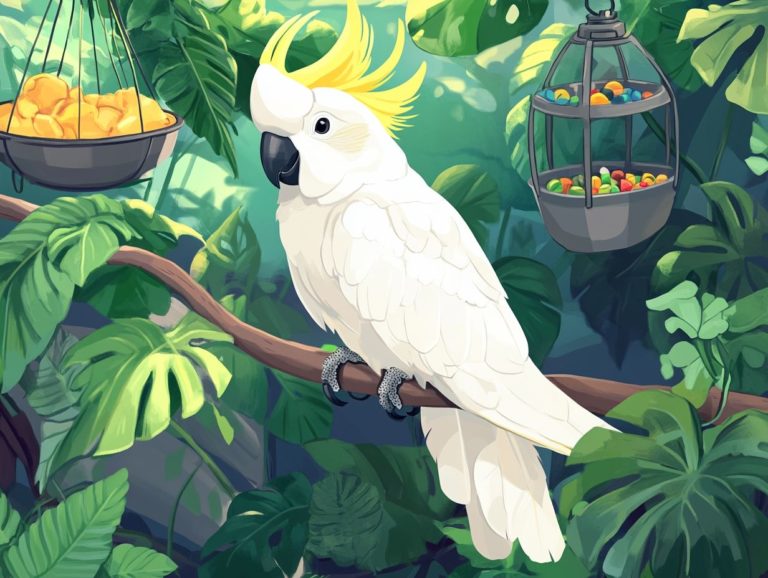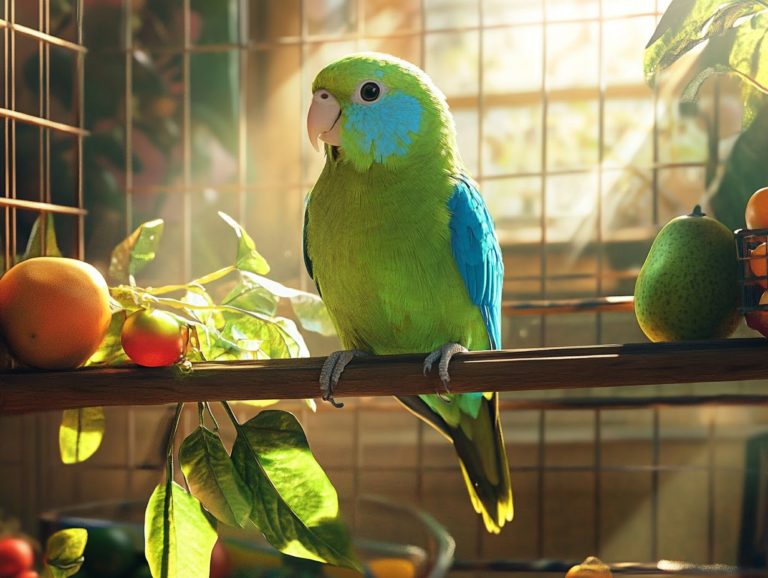Best Foods for Finches: A Comprehensive List
Feeding finches the right diet is crucial for their overall health and happiness.
In this article, you ll explore the finest food options to keep your feathered friends thriving. These options range from seeds and grains to an assortment of fruits and insects.
You’ll also learn about their nutritional needs, discover foods to avoid, and pick up practical feeding tips to ensure your finches enjoy a balanced diet.
This article will also highlight common health issues related to diet.
Discover the best foods that will keep your finches happy and thriving!
Contents
- Key Takeaways:
- 1. Seeds
- 2. Grains
- 3. Fruits
- 4. Vegetables
- 5. Insects
- 6. Nuts
- 7. Berries
- 8. Greens
- 9. Millet
- 10. Dried Mealworms
- 11. Sunflower Seeds
- 12. Corn
- 13. Peanuts
- 14. Safflower Seeds
- 15. Oatmeal
- What Are the Nutritional Needs of Finches?
- Frequently Asked Questions
- What are some of the best foods for finches?
- Why is a comprehensive list of foods important for finches?
- Are there non-seed foods that are good for finches?
- How often should I offer a variety of foods to my finches?
- Can I mix different types of seeds together for my finches?
- Is it necessary to provide a calcium source for finches?
Key Takeaways:
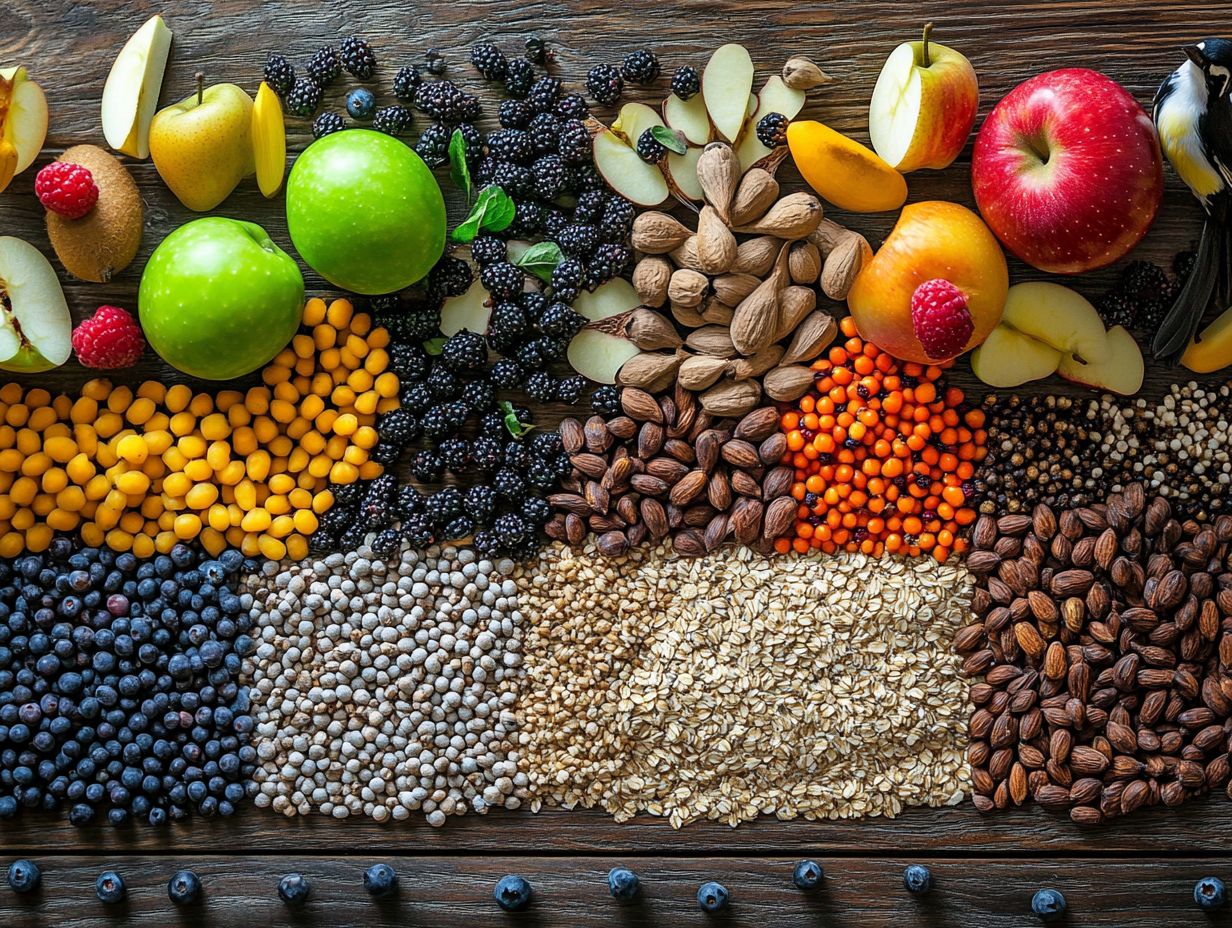
- Include a variety of seeds, grains, fruits, and vegetables in a finch’s diet to meet their nutritional needs.
- Insects, nuts, and dried mealworms can also provide important protein for finches.
- Avoid feeding finches foods high in sugar, salt, and fat. Always provide fresh water.
1. Seeds
Seeds are an important part of your finch’s diet, especially if you care for the vibrant gouldian finch. They provide the necessary proteins, minerals, and energy needed for their diet. A balanced seed mix can include various options, such as millet and sunflower seeds.
Millet is a favorite because it has a high carbohydrate content, giving these little dynamos a quick energy boost for their active lifestyles. Sunflower seeds provide healthy fats, proteins, and vitamins, supporting their feather health and overall vitality.
Offering a diverse seed mix ensures that your finches receive various nutrients while encouraging their natural foraging instincts. This stimulates their minds and keeps them physically active. A well-rounded selection of seeds is essential for maintaining the health, vibrancy, and longevity of these delightful birds.
2. Grains
Grains are essential to the dietary needs of finches, serving as an important source of carbs and nutrients that support their overall health and energy levels.
Oats, barley, and millet are particularly beneficial choices, offering not only energy but also fiber that helps with digestion. Oats help maintain healthy feather conditions, while barley adds necessary minerals and a taste that finches enjoy.
For a complete diet, consider incorporating high-quality bird pellets from reputable brands like Roudybush and Harrison’s. These specially formulated pellets provide a complete nutrition profile, complementing grains and ensuring finches receive all the vitamins and minerals they need for optimal health and longevity.
3. Fruits
Fruits are a great source of vitamins and hydration for finches, making them a vital part of their diet that meets various nutritional needs while adding variety to their meals.
By offering a mix of fruits like apples, bananas, and blueberries, you keep their dining experience engaging and ensure they receive essential nutrients that support their health. Remember to wash the fruits thoroughly and cut them into small, manageable pieces to prevent choking hazards and encourage finches to peck and savor their treats.
While these fruits are packed with beneficial vitamins, be mindful of certain options, such as citrus fruits, which can upset their stomachs. Stick to safer choices to promote their well-being.
4. Vegetables
Incorporating vegetables into your finches’ diet can significantly enhance the nutrients they need, providing vital vitamins and minerals that support their overall health.
Offer a colorful array of vegetables like fresh broccoli, crunchy carrots, and vibrant bell peppers. This makes mealtime appealing and nutritious.
These vegetables catch the eye of your finches and are packed with essential nutrients, such as vitamin A, which promotes good vision and robust immune function.
By providing chopped vegetables daily, you ensure they enjoy a balanced diet crucial for their energy levels and longevity. Fresh produce should always be a staple in their feeding routine, as it aids in maintaining proper hydration and encourages natural searching for food, which keeps them active and engaged.
5. Insects
Insects are a remarkable high-protein food source for finches, playing a crucial role in their growth, reproduction, and overall energy, especially during breeding seasons.
These delightful small birds thrive on a variety of insects, with dried mealworms being a favored option due to their convenience and nutritional benefits. Simply sprinkle a few dried mealworms into their standard seed mix or present them as a standalone treat.
Insects provide essential protein, fats, and other nutrients that support these birds during the demanding breeding period. This boosts their vitality and helps maintain a vibrant plumage.
6. Nuts
Nuts are a fantastic treat for your finches, offering high energy content and essential fats vital for their overall health.
Among the various types of nuts that finches can enjoy, peanuts stand out for their taste and nutritional value. However, remember that moderation is key to preventing weight gain and related health issues.
For a well-rounded diet, consider offering a mix of unsalted peanuts, almonds, and walnuts, ensuring they receive a balanced intake of nutrients. Chop the nuts into manageable pieces to mix them into their seed blend periodically; this allows their natural foraging instincts to flourish and makes mealtime an engaging experience.
7. Berries
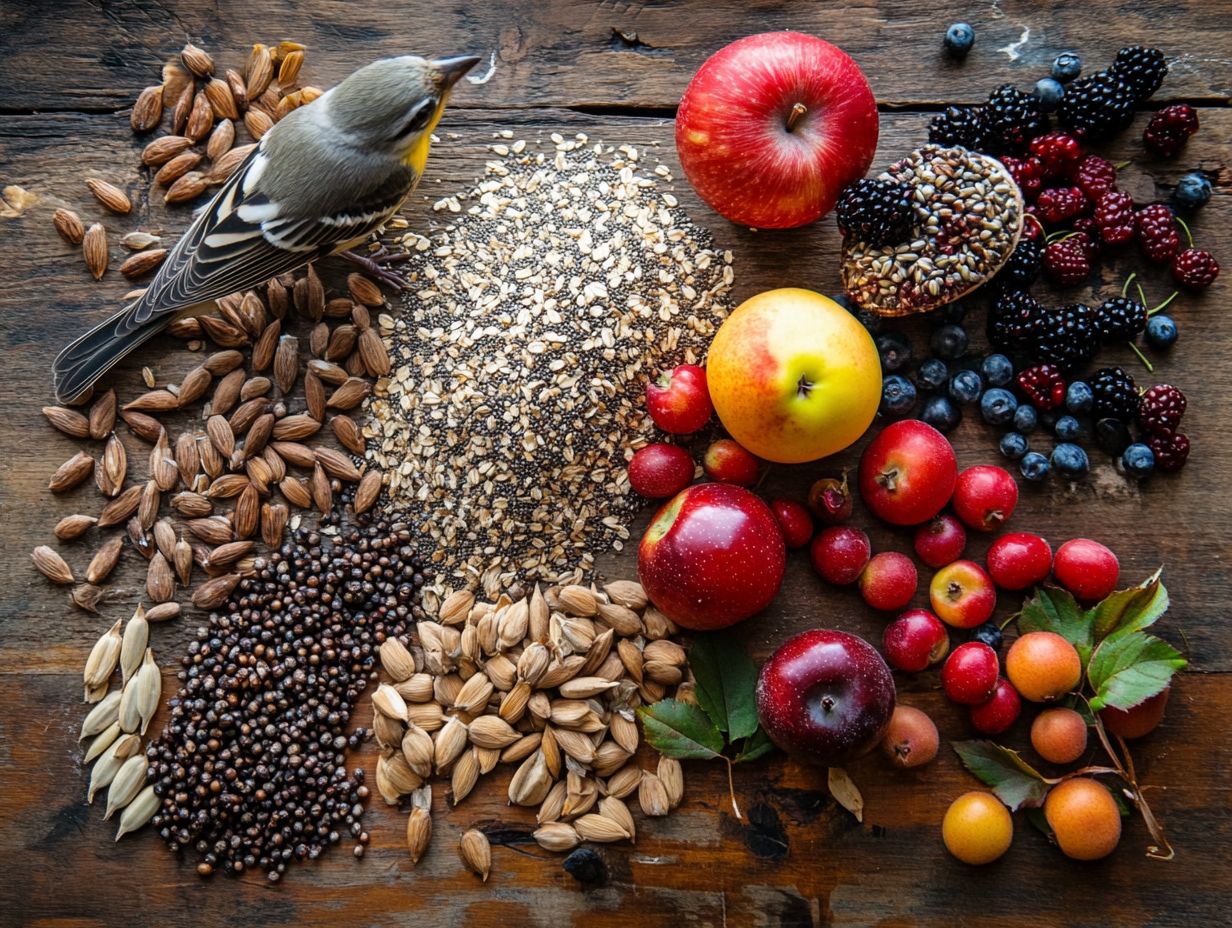
Berries are a delightful and nutritious treat for finches, offering a wealth of antioxidants, vitamins, and moisture that cater perfectly to their dietary needs.
These tiny powerhouses strawberries, raspberries, and blueberries not only deliver essential nutrients; they also enhance the vibrant plumage and overall health of your finches. Serving them fresh or lightly mashed can elevate their appeal, ensuring that each bite is a joyous experience for the birds.
Choosing organic berries guarantees these tasty morsels are free from harmful pesticides, further supporting your birds’ well-being.
Incorporating a variety of berries into their diet means your finches will enjoy a delightful medley of flavors and textures, making mealtime a satisfying adventure while promoting their longevity and vitality.
8. Greens
Dark leafy greens are a remarkable source of essential nutrients for finches, offering a wealth of vitamins, minerals, and fiber that bolster their overall health.
Among the best options, spinach and kale stand out, brimming with vitamins A, C, and K crucial for maintaining robust immune systems and promoting vibrant feathers. To easily incorporate these greens into their diet, finely chop them and mix them with their regular seeds or present them as fresh snacks.
Introducing a variety of greens throughout the week not only combats dietary monotony but also encourages foraging behavior, ultimately enhancing their well-being. Just remember to wash the greens thoroughly to eliminate any pesticides or contaminants, ensuring a safe and nutritious treat for these lively little birds.
9. Millet
Millet is a staple in the diet of finches. It provides an excellent source of carbohydrates and essential nutrients that meet their dietary needs.
Incorporating millet into seed mixes supports their energy requirements and enhances their overall health. Finches can enjoy millet in various forms: loose seeds, millet sprays, or ground into a fine powder. This variety caters to their unique feeding preferences.
Offering these diverse options ensures your feathered companions receive a balanced diet rich in vitamins and minerals crucial for healthy growth and vibrant plumage. Adding millet can really boost your finch s health and happiness!
10. Dried Mealworms
Dried mealworms are a premium choice for finches. They deliver a concentrated source of protein tailored to their dietary needs, especially during growth and breeding seasons.
Incorporating dried mealworms into your finch’s diet elevates their nutritional needs. These small bites can be introduced as an enticing treat or blended into their regular feed to ensure they receive essential nutrients.
To maintain diversity in their diet, combine dried mealworms with seeds, fresh fruits, or greens. This combination fosters overall health and vitality. Don t miss out on giving your finches that extra protein boost watch their plumage shine!
11. Sunflower Seeds
Sunflower seeds are an exceptional choice for finches. They provide a well-balanced mix of fats, proteins, and essential nutrients that cater to their energy needs.
These seeds come in two main varieties: black oil sunflower seeds and striped sunflower seeds. The black oil seeds are favored for their high oil content, serving as an excellent energy source. The striped seeds are larger and provide a satisfying challenge for the birds.
Both types are rich in vitamins E and B, along with essential minerals like magnesium and selenium, vital for promoting a healthy immune system. Mix sunflower seeds with other seeds, fruits, and greens to mimic their natural foraging habits and support their overall well-being.
12. Corn
Corn is an excellent source of carbohydrates for finches, providing energy and introducing variety to their meals when offered correctly.
Present corn in various forms to enhance a finch’s diet. Fresh corn is juicy and packed with nutrients, elevating hydration levels, especially beneficial during warm months.
Cooked corn is easier to digest, serving as a fantastic option for birds that may struggle with tougher grains. Dried corn has a longer shelf life and retains concentrated energy. Offer it in moderation to avoid overconsumption.
Each preparation brings unique advantages. Rotating these forms will help you maintain a balanced and enticing diet for these delightful little birds.
13. Peanuts
Peanuts are a nutritious addition to your finch’s diet. They provide essential fats and proteins that cater to their dietary needs.
Introduce peanuts thoughtfully to prevent overindulgence, which could lead to obesity and other health issues. Start with small amounts, mixing crushed peanuts with their usual seeds, and monitor their response. Maintaining moderate portion sizes will help sustain a balanced diet.
Make sure the peanuts are unsalted and free from added sugars or flavors. Observing your feathered friend’s behavior and health after introducing peanuts will help you adjust for their optimal well-being.
Conclusion: Providing a varied diet for your finches is essential for their health and happiness. Incorporate millet, dried mealworms, sunflower seeds, corn, and peanuts into their meals, and refer to what do pet birds eat? to ensure they receive the nutrients they need to thrive.
14. Safflower Seeds
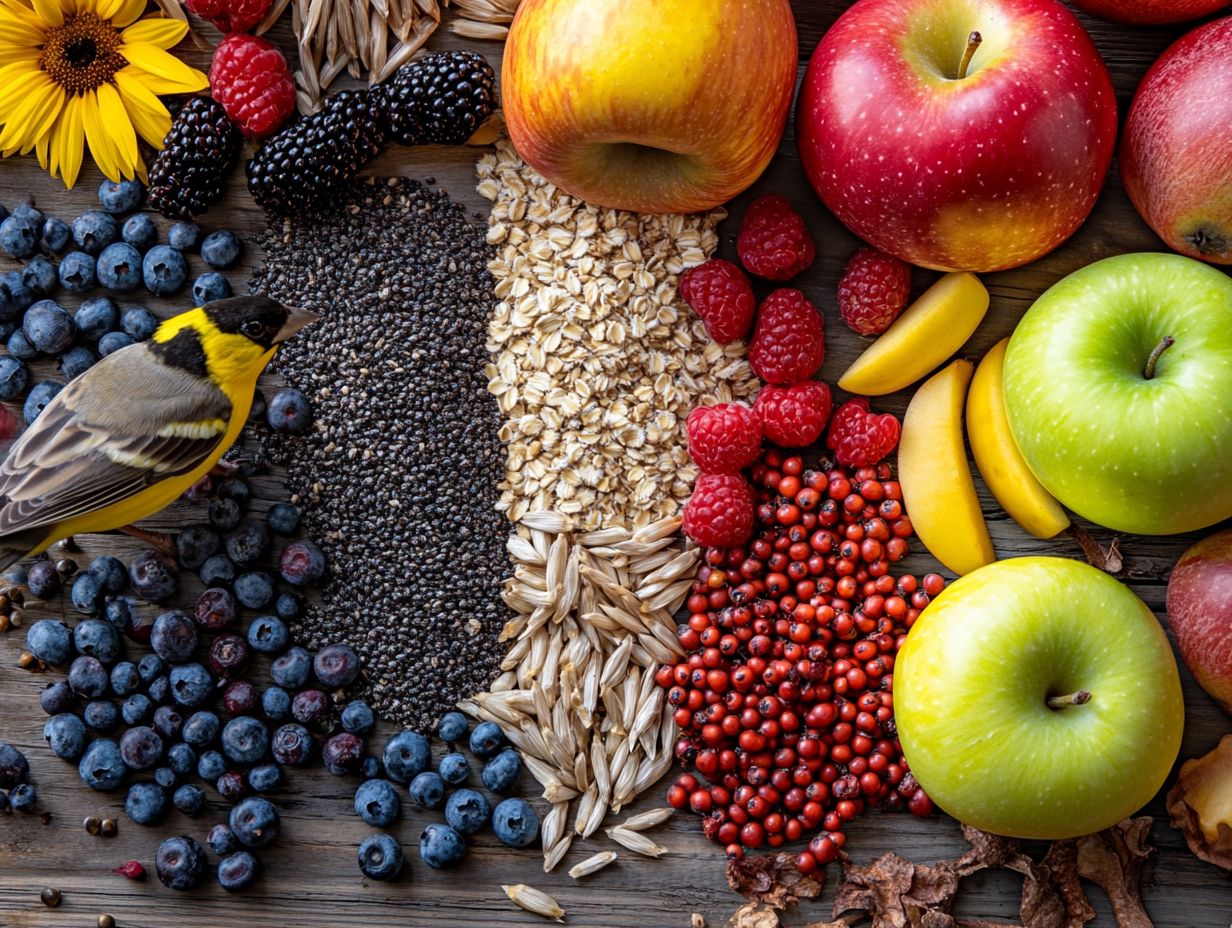
Safflower seeds present a premium choice for finches, delivering a rich source of nutrients that cater to their dietary needs while introducing a delightful change from the usual seed offerings.
These tiny nutritional powerhouses are brimming with healthy fats, protein, and essential vitamins, making them an exceptional addition to enhance your finch’s overall health. Their slightly nutty flavor is particularly appealing, encouraging even the pickiest eaters to try something new.
Integrating safflower seeds into their daily regimen is easy to do. Mix them into their regular seed blend or offer them as a tasty treat in a separate dish.
This approach not only adds diversity to their diet but also ensures they receive the essential fatty acids vital for maintaining vibrant feathers and sustaining their energy levels.
15. Oatmeal
Oatmeal can be a nutritious and fiber-rich addition to your finch’s diet, significantly supporting their digestive health and overall well-being.
By incorporating oatmeal in various forms whether served cooked or raw you can offer your finches a tasty treat that meets their dietary needs. Cooked oatmeal becomes softened, making it easier for these small birds to consume. Raw oatmeal, in the form of flakes or instant oats, provides that satisfying crunch that many finches adore.
This versatile food also delivers essential carbohydrates and boosts vital energy levels, making it an ideal choice for your active finches. Regularly including oatmeal in their diet promotes digestive health and lays a nourishing foundation for vibrant plumage and lively behavior.
What Are the Nutritional Needs of Finches?
Understanding the nutritional needs of finches is key to ensuring their health and happiness. These small birds require a balanced diet, rich in proteins, minerals, and vitamins, to truly thrive, whether in captivity or the wild. Proper nutrition plays a vital role in their growth, reproduction, and overall energy levels. It involves a thoughtful selection of seeds, grains, fruits, vegetables, and supplements tailored to their unique dietary needs.
A protein-rich diet is crucial for juvenile finches and those in the breeding phase. You can source this protein from high-quality seeds like hemp and canary seed. Carbohydrates, primarily found in millet and oats, will provide the energy necessary for their daily activities. Don t forget about healthy fats from sources such as sunflower seeds, which support feather development and overall vitality.
Incorporating a variety of fresh fruits and vegetables into their meals ensures they receive essential vitamins and minerals, like calcium and vitamin A, which are critical for bone health and immune function. Supplementing their diet with specialized finch pellets can also help fill any missing nutrients, promoting their long-term well-being.
What Foods Should Be Avoided for Finches?
Certain foods must be strictly avoided in the diet of finches, as they can be harmful or even toxic, jeopardizing their health and well-being. You need to be aware that items like caffeine, chocolate, and citrus fruits can have adverse effects on these little birds. It s crucial for you to stay informed about what to keep out of their diet to ensure a safe and nutritious feeding regimen.
For instance, avocados contain a toxin called persin, a harmful compound that can lead to heart damage and other serious health issues in finches. Similarly, onion and garlic can result in gastrointestinal disturbances and hemolytic anemia.
It s essential to recognize that not all human foods are suitable for these delicate creatures. Instead, focus on incorporating safe alternatives into their diets, such as:
- High-quality finch seed blends
- Leafy greens
- Small amounts of cooked grains
These options will provide the proper nutrients finches need while keeping them healthy and vibrant.
How Can You Ensure Your Finches Get a Balanced Diet?
Ensuring your finches receive a balanced diet involves selecting various food types that meet their dietary needs. Incorporate fresh food items along with high-quality commercial bird pellets.
Emphasizing a diverse range of seeds, grains, fruits, and vegetables can significantly enhance the nutritional quality of your pets’ meals. Each food group plays a crucial role; for instance, seeds provide essential fats and proteins, while fruits and vegetables deliver vital vitamins and minerals.
To keep their diet engaging, consider rotating these food types weekly. A delightful mix of colors and textures will stimulate their interest and contribute to their overall enjoyment.
Check your finches’ weight, feathers, and energy levels regularly. This helps you know if they are healthy and happy.
What Are the Best Ways to Feed Your Finches?
Effective feeding methods can elevate your finches’ health and enjoyment of food, ensuring they receive the right nutrition while encouraging their natural foraging instincts.
Explore various approaches like using specialized feeders, offering fresh fruits and vegetables, and crafting a nutritious seed mix. Each method has unique benefits. Specialized feeders can reduce waste and keep food clean, while fresh offerings introduce essential vitamins and minerals.
A thoughtfully curated seed mix can incorporate a variety of grains and seeds that promote healthy foraging behaviors. Regularly change the types of food you offer and observe their feeding habits. Keeping an eye on what your finches eat can really boost their happiness!
What Health Issues Can Diet Cause in Finches?
Diet plays a crucial role in the health of your finches. Improper nutrition can lead to common health issues like obesity and papilloma, which is a type of growth that can occur due to poor diet.
These conditions may present themselves as lethargy, feather plucking, or changes in droppings. It’s vital to remain vigilant. By monitoring your finch’s dietary intake, you can ensure they enjoy a well-balanced mix of seeds, fresh fruits, and leafy greens.
Regularly check food portions and maintain a clean feeding area to prevent spoilage and contamination. This also helps you spot any irregular eating habits that might indicate underlying health concerns. Consulting with an avian veterinarian can offer tailored dietary recommendations, helping your finches thrive in their vibrant, lively existence.
Frequently Asked Questions
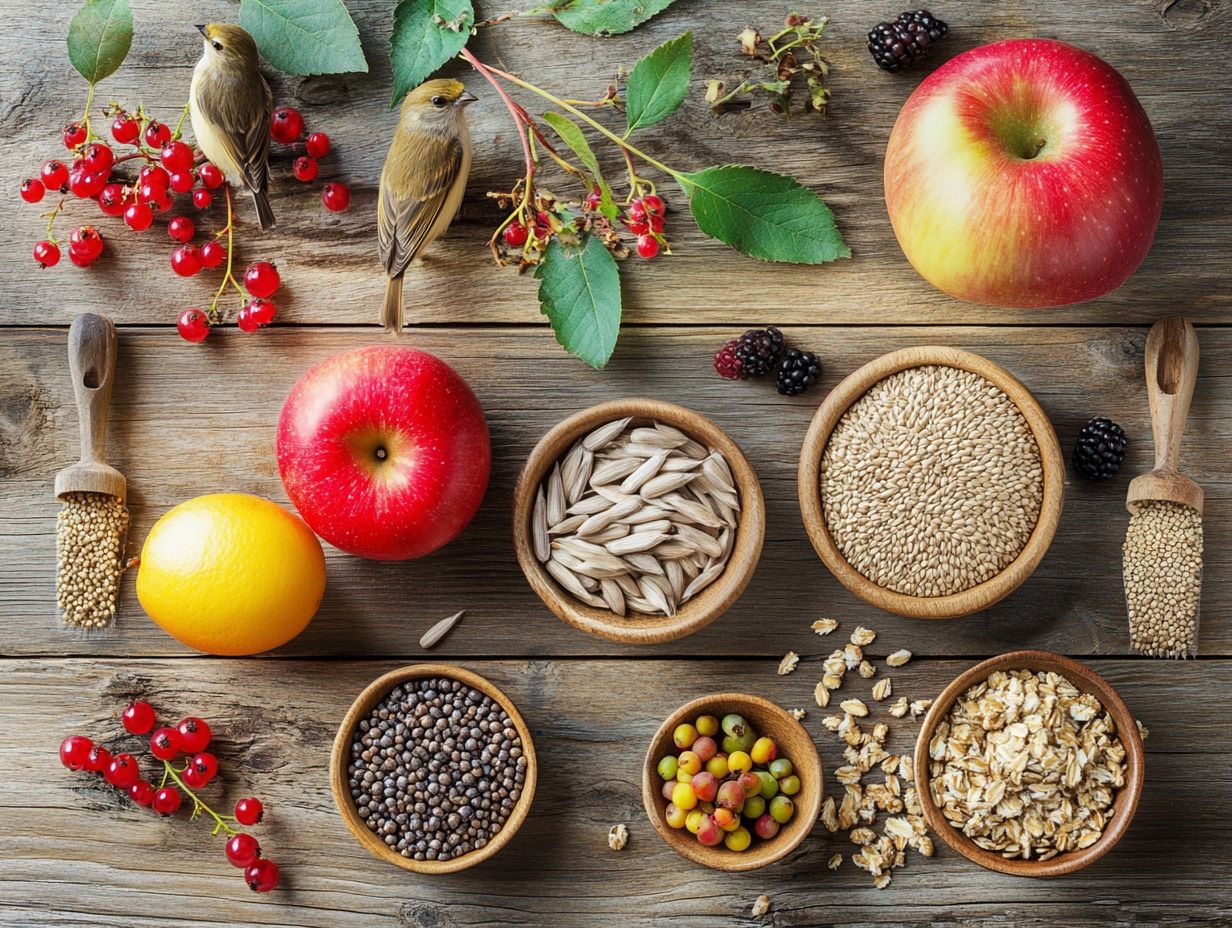
What are some of the best foods for finches?
Good foods for finches are millet, nyjer, and canary seed. These seeds are nutritious and high in protein.
Why is a comprehensive list of foods important for finches?
A comprehensive list of foods is important for finches because it ensures they get a well-rounded and balanced diet. For more detailed information, refer to finch feeding: a guide to proper nutrition. Different seeds provide different nutrients, and a variety of options helps prevent nutritional deficiencies.
Are there non-seed foods that are good for finches?
Yes, fresh fruits and vegetables are good for finches. They can also enjoy small amounts of cooked eggs or mealworms for added protein in their diet.
How often should I offer a variety of foods to my finches?
Offer a variety of foods to your finches daily. This ensures they have access to diverse nutrients and prevents them from becoming picky eaters.
Can I mix different types of seeds together for my finches?
Yes, mixing different types of seeds helps prevent your finches from picking out only their favorites and ensures a balanced diet. Just make sure to offer a variety of seeds regularly.
For more tips on finch care, consider consulting an avian veterinarian or joining a community focused on bird care.
Is it necessary to provide a calcium source for finches?
Yes, finches absolutely need a calcium source, especially if they are breeding. Don’t overlook this essential care!
Provide cuttlebone or crushed eggshells to support their bone health and prevent serious issues like egg-binding.

